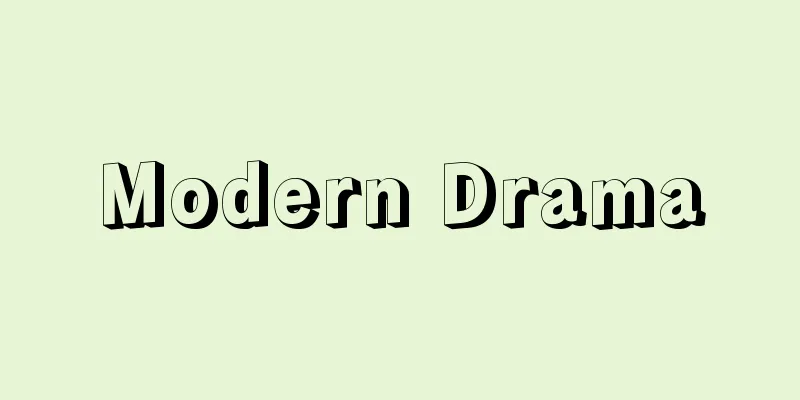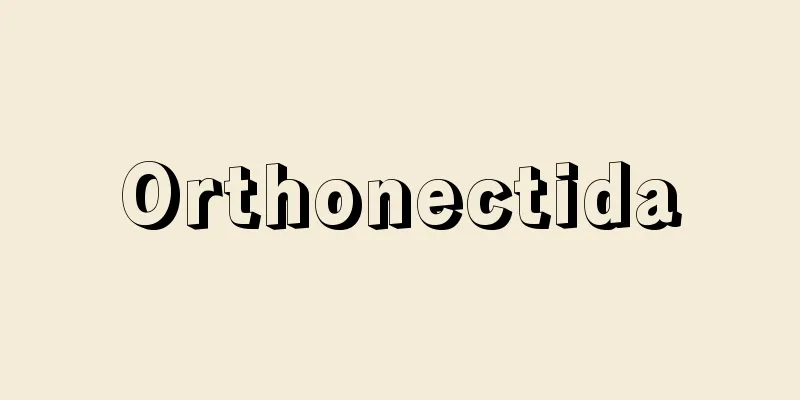Modern Drama

|
This refers to the innovative theatrical thought and movement that spread from Europe to countries around the world from the late 19th century to the early 20th century. In a broad sense, it includes all modern theater that was born against the backdrop of a modern civil society that awakened to individual consciousness as the Industrial Revolution progressed, but strictly speaking, it refers to a series of theatrical movements that aimed for highly artistic content, centered on the Free Theater Movement, which arose in France from the 1880s to around 1910 and eventually spread to other European countries. It was in the mid-18th century that Diderot advocated the idea of "bourgeois drama" as an intermediate genre that seriously and head-on dealt with the lives of the emerging bourgeois class, which could not be contained within the standards of "tragedy" and "comedy" in classical drama. After the era of Romantic drama from the late 18th century to the first half of the 19th century, the mid-19th century saw the emergence of realistic bourgeois tragedies, such as Hebbel's Maria Magdalena (1844), which dealt with the urgent problems of bourgeois society, and Otto Ludwig and Ostrovsky's Bourgeois tragedies. It was the Norwegian playwright Ibsen who perfected this tradition of bourgeois tragedy and is called the "father of modern drama." Through social plays such as "Pillars of Society" (1877), "A Doll's House" (1879), "Ghosts" (1881), and "An Enemy of the People" (1882), Ibsen exposed and exposed in a realistic manner the problems inherent in civil society in the period of disintegration, such as the awakening of the modern ego, human liberation, the influence of heredity, and the conflict between society and the individual. After him, Strindberg, Tolstoy, Hauptmann, and others produced highly realistic plays, and Maeterlinck and others who were symbolists followed in Ibsen's footsteps. At that time, research into natural sciences, especially biology, progressed, and with the rapid progress of technology, a scientific way of looking at things and the spirit of positivism gradually spread. Cultivated by this rational modern spirit, naturalist literature was born in France in the second half of the 19th century. Among them, Zola published "Naturalism in the Theatre" (1881), which dealt with people living in reality and advocated delving into the drama created by character and environment. Antoine, a Frenchman who resonated with Zola's ideas and Jean Jullien's theory of theater, which aimed to recreate fragments of real life on stage and create plays with life-like movements, founded the Free Theatre in Paris in 1887, and tried to recreate the true, natural appearance of life on stage. By removing the fourth wall facing the stage, he showed real life as it was, without any lies, and achieved groundbreaking results in the performance of naturalistic plays such as Tolstoy's "The Forces of Darkness" and Ibsen's "Ghosts." The number of commercial theaters increased and theater became more commercialized, and starism and empty, vulgar theater were prevalent in the European theater world. Antoine's Free Theatre rebelled against this trend, starting an experimental and research-oriented small theater movement with a membership system from an anti-commercial standpoint. The influence of the Free Theatre spread quickly throughout Europe, sparking the modern theater movement in each country. In Germany, Brahm founded the Free Theatre in 1889, and launched Hauptmann as a playwright. In England, Jacob Glyne established an independent theatre in 1891, performing plays by Bernard Shaw and others, and in 1898, Wheelen established the Stage Society. In Ireland in 1899, Yeats and others launched a movement to establish a national theatre, which later became the Irish Theatre Company based at the Abbey Theatre and triggered the small theatre movement in America. In 1898, Stanislavsky and Nemirovich-Danchenko founded the Moscow Art Theatre in Russia, and with their realistic acting techniques, they produced outstanding Russian writers such as Chekhov and Gorky in The Cherry Orchard (1903). The Free Theatre (established in 1909), founded by Osanai Kaoru and Ichikawa Sadanji II, which was the beginning of the new theatre movement in Japan, was also born under the influence of this European modern theatre movement. The modern theater movement, which spread to countries around the world, placed the highest priority on plays written by modern playwrights, rejected stardom, and created highly accurate stage productions through ensemble actors and the emergence of directors as artistic leaders. In this way, the modern theater movement was completed, and eventually, after World War I, it created the foundation for the diverse development of contemporary theater that would emerge in various countries. [Hiroyuki Fujiki] "Twelve Lectures on Modern Drama" by Hajime Yamada (1953, Miraisha) " "Chikuma World Literature Series 84: Modern Drama Collection" (1974, Chikuma Shobo) " "The Development of Modern Drama" by Toshio Kawatake (1982, Japan Broadcasting Publishing Association) [References] | |Source: Shogakukan Encyclopedia Nipponica About Encyclopedia Nipponica Information | Legend |
|
19世紀末期から20世紀初頭にかけて、ヨーロッパから世界各国に広まった革新的な演劇思潮、運動をいう。広義には、産業革命の進展に伴う、個人意識に目覚めた近代市民社会を背景に生まれた近代演劇全般を含むが、厳密には、1880年代から1910年前後にかけてフランスにおこり、やがてヨーロッパ各国に波及した自由劇場運動を中心とした、一連の高度な芸術的内容を目ざす演劇運動をさす。 古典主義演劇の「悲劇」「喜劇」の規範では収まりきれない、新興の市民階級の生活をまじめに正面から取り上げた中間的ジャンルとしての「市民劇」が、ディドロによって提唱されたのは18世紀のなかばであった。18世紀末から19世紀前半のロマン主義演劇の時代を経て、19世紀なかばには、市民社会の切実な問題を扱ったヘッベルの『マリア・マグダレーナ』(1844)をはじめ、オットー・ルードウィヒ、オストロフスキーらの写実的な市民悲劇が生まれてきた。この市民悲劇の伝統を完成させ「近代劇の父」とよばれたのが、ノルウェーの劇作家イプセンであった。『社会の柱』(1877)、『人形の家』(1879)、『幽霊』(1881)、『民衆の敵』(1882)などの社会劇によって、近代的な自我の覚醒(かくせい)、人間の解放、遺伝の影響、社会と個人の対立など、解体期の市民社会に内在する諸問題を、リアルな手法で暴露し、えぐりだした。以降、ストリンドベリ、トルストイ、ハウプトマンらも高い水準の写実主義戯曲を発表し、象徴主義によるメーテルリンクらもイプセンの後を追った。このころ生物学を中心に自然科学の研究が進み、また急速な技術の進歩により、科学的なものの見方と、実証主義の精神がしだいに広まり、このような合理的な近代精神に培われて、フランスでは自然主義文学が19世紀後半に生まれた。なかでもゾラは『演劇における自然主義』(1881)を発表し、現実のなかに生きる人間を取り扱い、性格と環境の生み出すドラマを掘り下げることを提唱した。 ゾラの主張や、実生活の断片を舞台に再現し、生命による動きの劇を目ざしたジャン・ジュリアンの演劇論に共鳴したフランスのアントアーヌは、1887年パリで自由劇場をおこし、自然な人生の真実の姿を舞台に再現しようとした。舞台に面した第四の壁を取り去った、嘘(うそ)のないありのままの現実の生活を舞台に示し、トルストイの『闇(やみ)の力』、イプセンの『幽霊』など自然主義戯曲の上演に画期的な成果を収めた。商業劇場が増加して演劇の商品化が進み、スター主義と空疎で低俗な演劇の流行していたヨーロッパ劇壇の風潮に反旗を翻し、反営利主義の立場から会員制度による実験的・研究的な小劇場運動を始めたアントアーヌの自由劇場の影響は、またたくまにヨーロッパ全土に波及し、各国に近代劇運動が巻き起こった。ドイツでは、1889年にブラームが自由舞台を創立し、ハウプトマンを作家として送り出した。イギリスでは、91年にジェイコブ・グラインが独立劇場をおこし、バーナード・ショーらの戯曲を取り上げ、98年にはホイーレンによるステージ・ソサエティ(舞台協会)が設立された。99年にはアイルランドでイェーツらにより国民演劇樹立の運動がおこり、のちアベイ劇場に拠(よ)るアイルランド劇団となり、アメリカの小劇場運動を誘発した。98年にはロシアでスタニスラフスキーとネミロビチ・ダンチェンコがモスクワ芸術座を創立し、リアルな演技術により、『桜の園』(1903)のチェーホフやゴーリキーなど優れた自国の作家を生み出している。日本の新劇運動の端緒となった小山内薫(おさないかおる)、2世市川左団次による自由劇場(1909創立)もこうしたヨーロッパの近代劇運動の影響下に誕生したものであった。 世界各国に及んだ近代劇運動は、近代劇作家の創作した戯曲を第一に尊重し、スター主義を否定してアンサンブルのとれた演技陣と、芸術的統率者としての演出者の出現により、精度の高い舞台を創造していった。こうして近代劇運動は完成され、やがて第一次世界大戦を境に、各国に巻き起こる現代演劇の多様な展開の基盤をつくりあげたのであった。 [藤木宏幸] 『山田肇著『近代劇十二講』(1953・未来社)』▽『『筑摩世界文学大系84 近代劇集』(1974・筑摩書房)』▽『河竹登志夫著『近代演劇の展開』(1982・日本放送出版協会)』 [参照項目] | |出典 小学館 日本大百科全書(ニッポニカ)日本大百科全書(ニッポニカ)について 情報 | 凡例 |
Recommend
Suture of blood vessel
Suturing blood vessels. Synthetic fiber thread is ...
Alectoris
…Among the partridges, the European partridge ( P...
Allotype
… The only specimen designated by the namer in a ...
Fluorite - Hotaruishi (English spelling) fluorite
Along with rock salt, it is one of the most commo...
Atropos - Atropos
Please see the Moirai page. Source: Encyclopaedia...
Stephen (Greek: Stephanos)
One of the early Christian leaders and the first ...
Antiphon - Antiphon (English spelling)
An ancient Greek orator. He was active in Athens,...
Sir Sayyid Amad Khan
Indian Muslim thinker and social reformer. Born i...
Alepocephalidae
...The flesh is too watery to be eaten. The Alepo...
Laws of Ine
This is a code of law that is said to have been co...
Qi monism - Kiichigenron
…It rejected the Neo-Confucian dualism of Li and ...
Guidi, A.
…It is said that the origin of canzone is in the ...
Fang protection
Arranging for the disposal of stolen property for...
Werra
…A river that flows roughly north-south through c...
"Eka Danpizu"
…It is a monumental work along with Autumn and Wi...









